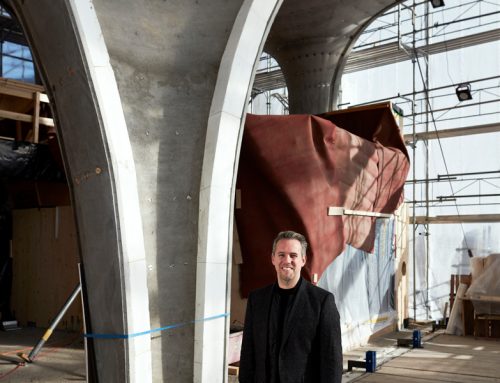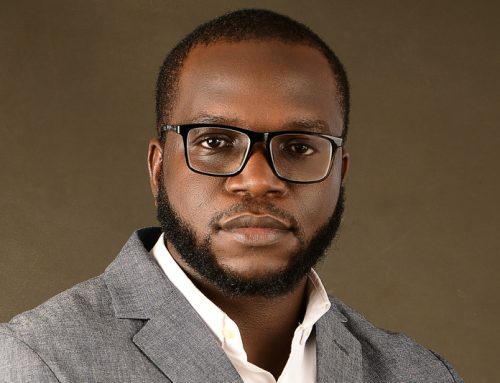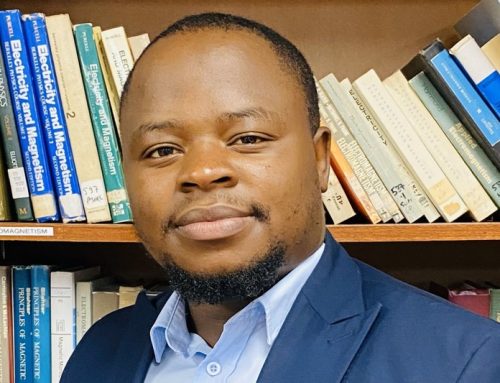 Neziswa Mcinga, known as ‘Pinky’, was 23 years of age and at a dead end in her life when computer skills came to her community in the deep rural region of Dwesa on the Wild Coast of the Eastern Cape.
Neziswa Mcinga, known as ‘Pinky’, was 23 years of age and at a dead end in her life when computer skills came to her community in the deep rural region of Dwesa on the Wild Coast of the Eastern Cape.
“I completed my matric in Dwesa in 2001 and afterwards I worked here and there as a domestic worker in East London, but what I really wanted to do was to study,” explains Mcinga who, like millions of young people in South Africa, was trapped in a world where lack of skills and money were alienating her from her aspirations.
Her prospects for tertiary education were non-existent as her father, Fundile Mcinga, who raised her and who lives in Dwesa, is unemployed and on a disability grant. She also has a young daughter and three siblings to look after.
Many people in the villages that populate Dwesa’s mountainous landscape are in a similar position, surviving on government grants and subsistence agriculture. Globalisation has bypassed this place where the closest town of Willowvale is 40 kilometres away. Plenty of time and money is spent on transport to Willowvale for shopping and general business. Endless hours are also dedicated to fetching firewood because several villages do not have electricity. Others are more fortunate.
“My family was really struggling and I had returned to Dwesa to be with them when I heard about this computer project called the Siyakhula Living Lab that Rhodes and Fort Hare universities were busy with in our community,” says Mcinga. “I discovered they were offering training to anyone who wanted to learn computer skills or ICT (Information and Communication Technology) as it is called, I immediately started attending classes. It was an opportunity to learn for free and I grabbed it.”
The Siyakhula Living Lab was initiated by Professor Alfredo Terzoli, head of the Telkom Centre of Excellence in Distributed Multimedia in the Department of Computer Science at Rhodes University. “We partner with the Telkom Centre of Excellence in ICT for Development at the University of Fort Hare on this project and we feel it is extremely important, especially when you consider that over 60% of South Africa’s population has no access to the Internet or any knowledge of how ICT can enhance their lives. Some can do the basics on cellphones but that is not enough,” he explains.
The project’s driving force is to facilitate effective and sustainable access to ICT in marginalised rural and peri-urban communities. “It brings a sense of being part of the world to people in remote rural areas; people who too often live with a sense that life happens elsewhere,” says Terzoli.
Schools with electricity in Dwesa were selected as the community ICT hubs, and, in consultation with school principals and the community, everyone agreed that the whole community should benefit from the computers, and be taught to use them.
The Siyakhula training team of postgraduate students started to regularly visit Dwesa from 2006 and has continued to do so ever since. The team currently includes five Masters and three PhD students from Rhodes and seven Masters and four PhD students from Fort Hare.
“At Fort Hare and at Rhodes we set out to develop students to not only complete their degrees but also to be sensitive to development issues and ethical leadership. We really hope that when they leave us to go out into the world they go with a heartfelt need to help others, which is what the Siyakhula Living Lab is all about,” says Professor Mamello Thinyane, head of the Telkom Centre of Excellence in the Department of Computer Science at Fort Hare University.
The first installation in 2006 was at Mpume Junior Secondary School, which has 159 learners, and where five computers were installed in the staff room. Other schools followed, including Ngwane Junior Secondary School, which has 182 learners, and where 20 computers have been installed. Siyakhula now has 17 participating schools, with learners from Grade R through to matric. Some of the schools have 400-600 learners.
“They were excited by the arrival of technology and got the hang of using the computers, email, social media and the Internet pretty quickly,” says Terzoli. “Typically, young people learn ICT faster than older people and the more time they spend on the computers the more they learn. From the community side, the women in particular have come to the schools to learn.”
One of these women was Mcinga. A fast learner and highly motivated she quickly picked up the skills. “I surprised myself because I was not a brilliant student at school,” she says. “What I have in my favour is that I always loved reading and finding out new things. Even if I saw a newspaper lying in the road I would pick it up, grab my dictionary and look up the words I didn’t understand.”
One of the first searches Mcinga did on the Internet was to look at the South African university sites, to see what was available to study.
Mcinga is a natural leader and she started helping the teams from Rhodes and Fort Hare to train community members. “I was learning and teaching at the same time,” she explains. “It helped that I was from Dwesa because I could identify with how people were feeling. Some were shy and intimidated by the students and academics in the beginning because they knew they were from the universities while many people in Dwesa are not educated or are less educated. It also helped that I speak Xhosa.”
The project created the opportunity for skills development, networking and exposure for Mcinga, who subsequently got a job as an admin clerk at one of the Siyakhula Living Lab schools.
“I worked there during school hours and then trained people from the community in the computer lab in the afternoons,” she says. With some understanding of hard- and software, she also doubled as the ‘technician’ on occasion when the computers stopped working. “I’d call Rhodes and they would explain to me what to do over the phone.”
The Siyakhula Living Lab uses open source software known as Ubuntu Linux. Not only is it for free, it’s resilient and robust, there have been no problems with viruses and relatively few problems with computers freezing and crashing, which is essential in a setting where technical expertise is unavailable.
“It is also available in African languages, which made it possible to run some of the Dwesa training sessions in Xhosa, with Xhosa teaching materials,” explains Professor Lorenzo Dalvit, MTN Chair of Media and Mobile Communication, Rhodes University, who was part of the first Siyakhula Living Lab team to visit the Dwesa community seven years ago. Dalvit also spearheaded the translation of the Google search interface into isiXhosa offering through Rhodes University’s School of Languages. “The next step is to translate parts of Wikipedia into isiXhosa,” he adds.
An important aspect of the Siyakhula Living Lab’s vision is to create a channel via a platform it has developed called TeleWeaver through which interested parties, notably the government, will be able to interact with people in marginalised communities such as Dwesa. Interactions can include registering of births and deaths, and of targeting health messages through the eHealth application. The channel is also useful for activities such as online selling of traditional craftwork or promotion of micro-tourism offerings.
Acquiring ICT skills has opened windows for thousands of Dwesa learners over the past seven years, during which time approximately 100 postgraduate students and researchers have visited Dwesa from the two universities.
“Because of the Siyakhula Living Lab Dwesa is now seen as a place where things happen rather than a place that is isolated from the rest of the world,” says Mcinga. “I have personally changed a lot. I now see myself as someone with important skills and plenty of opportunities.”
Mcinga’s story has been made into an SABC2 documentary called ‘Pinky and the Computer’ to inspire other young people from rural areas. She has since moved to Grahamstown and is now a member of the team at the Reed House Systems software company hosted at Rhodes that specialises in software suitable for rural areas. She is collaborating on the creation of e-services to be deployed in Dwesa and is also studying to be a social worker through Unisa.
“We’ve seen so many learners and community members like Pinky Mcinga grow through the project. We believe there are a whole lot of Pinkys out there who can benefit from ICT for development in a whole lot of ways and we want to do more,” says Thinyane.
To take the Siyakhula Living Lab to the next phase of far larger impact in many more communities, the project will need extensive support from government and the private sector.
“Our vision and goal is to go large,” continues Thinyane. “We think the model we have and what we are doing holds enormous potential to help people all over South Africa and into Africa.”




